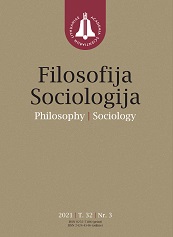The Relation Between Work and Thumos. A Critical Interrogation of the Motivation Behind Knowledge Work Compulsion
The Relation Between Work and Thumos. A Critical Interrogation of the Motivation Behind Knowledge Work Compulsion
Author(s): Benda HofmeyrSubject(s): Metaphysics, Political Philosophy, Social Philosophy, Ancient Philosphy, 19th Century Philosophy, Contemporary Philosophy, German Idealism, Labor relations, Social Norms / Social Control
Published by: Lietuvos mokslų akademijos leidykla
Keywords: Fukuyama; Hegel; Plato; thumos; neoliberalism; governmentality; knowledge work; work; labour;
Summary/Abstract: In this paper I attempt to come to a critical understanding of an intriguing phenomenon at the heart of a broader question, i.e. what are we today – as knowledge workers – in relation to our present understood as the globalising neoliberal governmentality in which life is reduced to constant work under conditions of comprehensive control? Previous attempts to interrogate the nature of knowledge work and the knowledge worker have led me to conclude that these workers do not work to live, but live to work. An important reason seems to be that the neoliberal knowledge worker works all the time because s/he paradoxically wants to. This presents a paradox since the overinvestment in knowledge work does not appear to generate proportionate gains for the working subject. In my attempt to arrive at some kind of explication for this phenomenon of compulsive work, I critically interrogate Fukuyama’s contention that work has a thumotic origin. To this end I briefly discuss Plato’s conceptualisation of thumos and Hegel’s understanding of the significance of labour.
Journal: Filosofija. Sociologija
- Issue Year: 32/2021
- Issue No: 3
- Page Range: 259-267
- Page Count: 9
- Language: English

